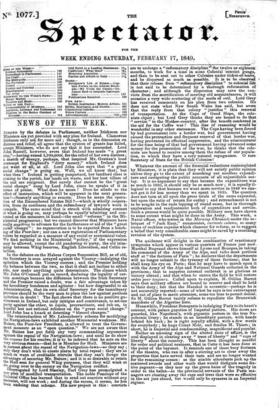NEWS OF THE WEEK.
JuDOED by the debates in Parliament, neither Irishmen nor Ministers are yet provided with any plan for Ireland. Clamorous Irishmen only ask for more aid ; though, as in the discussion on distress and relief, all agree that the system of grants has failed, except Ministers, who do not say that it has succeeded. Lord John Russell, however, avers that Ireland has made "a great step,"—having raised 1,700,0001. for the relief of her own distress ; a snatch of energy, perhaps, that inspired Mr. Grattan's loud contempt for England's "dirty money," which Ireland does not want at all, at all. Lord John also says that " a great social change" is going on. Well, we all know that; but what then ? Ireland is getting pauperized, her landlord class is coming to the parish, her lands are waste, and her best tillers of the soil are emigrant. But surely that cannot be the " great social change" sung by Lord John, since he speaks of it in terms of praise. What does he mean ? Does he allude to the effect of instruction, which will be apparent in the next genera. tion?—Scarcely anything so remote. Does he mean the opera- tion of the Encumbered Estates Bill ?—which is wholly inopera- tive, from its costliness and the redundancy of lawyer's work it compels. The same mind that is struck with admiring content at what is going on, may perhaps be equally admiring and con- tented at the measures in hand—the small " reforms " in the Mi- nisterial programme ; but we cannot discover that Ministers have really anything to advance for the furtherance or aid of the "great social change" : no regeneration is to be expected from a botch- ing of the Poor-law; nor can a new registration of Parliamentary voters be regarded as a measure of any social or economical value. We find nothing in the Ministerial "policy," if the expression may be allowed, except the old pandering to party, the old trim- ming between Whig-reserves, English Liberalism, and Celtic re- bellion.
In the debates on the Habeas Corpus Suspension Bill, as of old, the Secretary is seen arrayed against the Viceroy—indulging the agitation which the Viceroy coerces ; and the Premier holding the balance between the two, so that it shall not incline to either side, nor make anything quite determinate. The clause which Mr. John O'Connell put on record, declaring the legality of cer- tain meetings because the difference between the Irish Secretary and the Premier raised a doubt, was a fair advantage taken by the hereditary bondsman and agitator : but how disgraceful to an Administration, that its own chief Secretary for the tumultuary province should be the very man to place the law against perilous agitation in doubt ! The fact shows that there is no positive go- vernment in Ireland, but only intrigue and contrivance, to set one party against the other, to cajole, procrastinate, and rub on, in hopeful but not rational reliance on the "great social change." Lord John has a knack at detecting " blessed changes."
The reintroduction of Mr. Labouchere's scheme for modifying the Navigation-laws exhibited another Ministerial weakness. Mr. Barnes, the Poor-law President, is allowed to treat the Govern- ment measure as an "open question." We are not aware that Mr. Baines has put forth any very commanding arguments against the repeal of the Navigation-laws ; and until he do show the reasons for his resolve, it is to be inferred that he acts on the yell, obvious reason—that he is Member for Hull. -Ministers are in earnest about the repeal of the Navigation-laws--so they say ; only they don't wish to create alarm by total repeal : they are so much in want of creditable recruits that they can't forego the advantage of securing Mr. Baines ; and it is so desirable to retain the Hull seat for general Whig purposes, that they will wink at IrA going over to the enemy on the Navigation conflict.
Interrogated by Lord Stanley, Earl Grey has promulgated a plan of modified transportation. The noble Penelope of the Colonial Office has learned that to send out convicts without any restraint, will not work ; and during the recess, it seems, he has been undoing that scheme. His new project is this : convicts are to undergo a "reformatory discipline for twelve or eighteen' months, to work for a time in some Colonial convict gangs, and then to be sent out to other Colonies under ticket-of-leave and be dispersed as much as possible. It is to be observed that their release from " reformatory discipline" to colonial life is not said to be determined by a thorough reformation of character ; and although the dispersion may save the con- victs from the mortification of meeting old acquaintances, it will occasion a very wide scattering of the seeds of evil. Lord Grey has received comments on his plan from two colonies. He does not state what New South Wales has said, but avers that the reply from that colony " justifies " this renewal of transportation. At the Cape of Good Hope, the colo-
nists object; Lord Grey thinks they are bound to do that " service " to the Mother-country, after the benefit conferred in the aid for the Caffre war ! This line of reasoning would be wonderful in any other statesman. The Cape having been forced by bad government into a border war, bad government having caused the protraction and frequent renewal of that border war, having prevented its effectual suppression, and the administrator for the time being of that bad government having advanced some money for the prosecution of the war, he thinks that the colo- nists are bound to receive among them the refuse of our popula- tion, to which they have a very natural repugnance. 0 rare Secretary of State for the British Colonies!






















